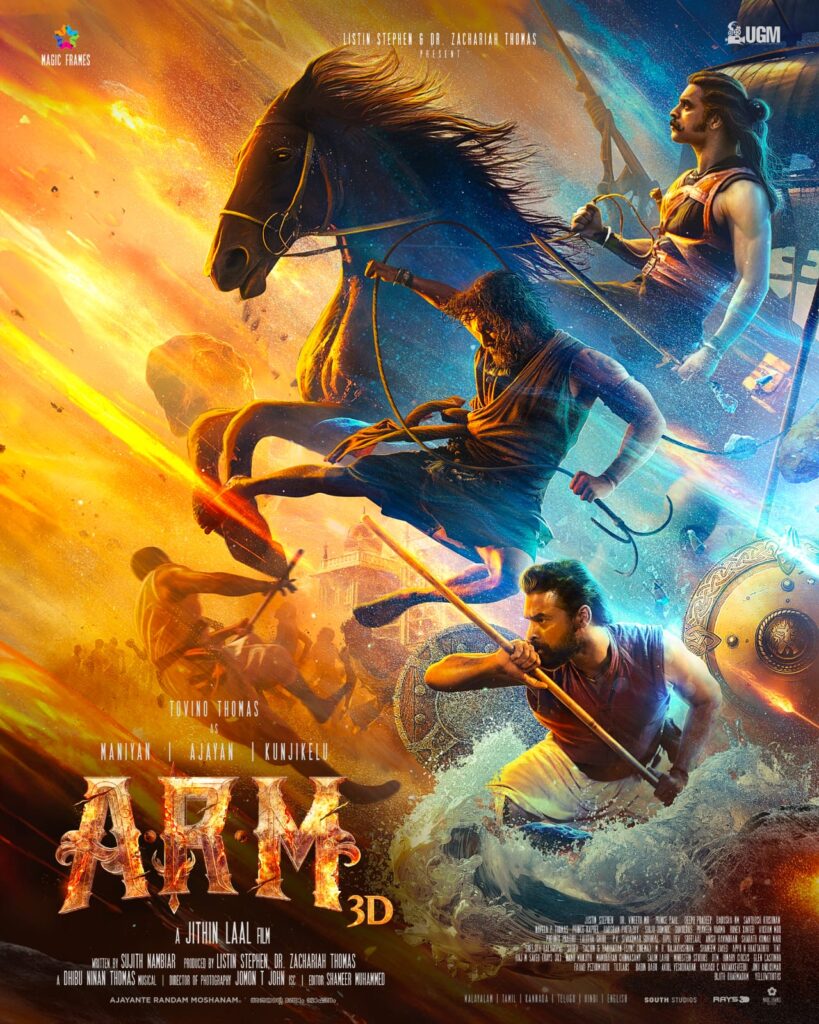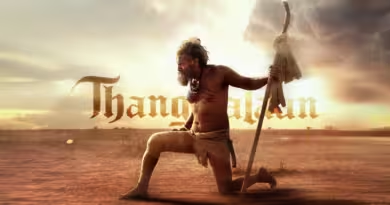ARM is a film that Tovino Thomas considers to be a landmark in his career.

The film is not really meant as a star vehicle even though Tovino Thomas is in a triple role. The creators had to tell the audience they should consider Malaikottai Vaalibhan as a bedtime narrative when it was first launched. The beautiful thing about ARM is that, a few minutes into the movie, newcomer Jithin Laal transports you to that zone from where you would be seeing it from a bedtime story point of view without that disclaimer. The absence of such events is most certainly a constraint for the film scheduled for a festival release. Still, the screenplay’s structure and the way caste politics are placed make it an appreciable effort with understandable shortcomings.
Krithi Shetty is teamed with Ajayan, and the two click quite clearly. The same holds true about Surabhi Lakshmi’s casting as Manikyam, opposing Maniyan. Basil Joseph plays a major part in the film at the same time as he is a comic relief. As one of the adversaries, Harish Uthaman was good; his Malayalam accent fit the role exactly. Looking convincing, Nisthar Sait was in his element. The complex ensemble of the movie goes under various other identities including Jagadish, Rohini, Sanju Sivaram, Aishwarya Rajesh, Sudheesh, Aju Varghese, etc.
The narrative takes place against the backdrop of this village called Haripuram, and our hero Ajayan is this young man who makes his living performing plumping and electrical work as well as tuition for children. The history of the hamlet and its temple is such that they hold the idol in that temple has the power to bring wealth. Ajayan’s ancestral background is not very outstanding since his grandfather Maniyan was a well-known burglar. Ajayante Randam Moshanam shows us a scenario whereby Ajayan discovers he is being held responsible for the characteristics of his grandfather.
Alert about spoilers! The narrative concept of the movie has a depth of sarcastic comedy. The narrative gently parodies the concept of the higher caste privilege of access to the idols; the legitimacy of the idol they are honouring is a matter of turns in the film. Fundamentally, the film revolves on a revolt. Towards the end of the movie, social fairness is beginning to be restored. Benevolent layers beneath this tale, more akin to mythology. The movie’s attention on making it an eventful narrative makes it interesting for its whole duration even if it has not too many elevating moments.
Sujith Nambiar’s layers in the script challenge ARM’s narrative to be shallow. From a scale point, nevertheless, it lacks a defining moment. Though in a sense duplicated in the movie’s climax, the way Kunjikkelu kills an enemy in the introduction of the film lacks the wow effect. Although the character arcs and some events—like the one in which Ajayan describes his mother entering the temple itself—a major accomplishment—have a soulfulness—you would sense that such events required a higher landing than what we presently witness.
Technically, the film boasts some truly impressive technical prowess. For world-building, for example, their use of visual effects and CGI is really wise. They are not using any pictures to replicate a showreel of the visual effects firm in the film. The CGI fits really well with the strong production design. Jomon T. John has handled the cinematography, and given each character a unique look, so there is clearly a style aspect. The pace is good and the editing is very deft. The movie’s 3D section is done rather cleanly since its focus is on giving the images life. Though some of the visual tricks can be forgiven considering the makers have to consider children are also viewing this movie, there are colouring discrepancies.
Making Ajayan, Kunjikkelu, and Maniyan, Tovino Thomas has given the film his heart and soul. Although Kunjikkelu appears in a little role in the movie, his performance of that character is absolutely graceful. Ajayan is a sensitive and fragile person with a lot on at stake. This is a character in Tovino; even if the tanning appeared fake, the acting was good. I found Maniyan appealing in terms of performance since it sort of highlights Tovino’s acting progress. In Kalki, his attempt at a mass-appealing hero came out as somewhat fake and somewhat funny. But here he really caught the peculiarity of this man with amazing conviction. The dialect component was likewise done orderly.
